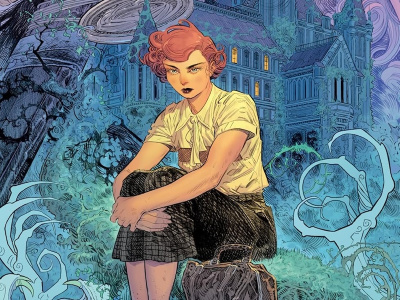Dara Hannon of Pyrimid Comics & Games in Sierra Vista, Arizona saw Steve Bennett’s recent column on low-selling titles (see “Confessions of a Comic Book Guy--Just Say No”) and retailer comments (see “Barry Branvold of Barry's Collectors Corner” and “Jay Bardyla of Happy Harbor Comics”), and says the Top 300 list should not dictate ordering in comic shops:
Well, Steve, Barry and Jay all brought up interesting points and I thought I’d throw my own opinion in.
Trying to dictate to a comic book company through your ordering is like trying to dictate to your customers the same way. It doesn’t work. I don’t care how great you think Batman is and how bad you think Atom is, if your customer likes Atom, you will not convince them to buy Batman just because you don’t stock Atom. It is rather an elitist attitude to think that what you think is a good comic book is what your customer will like. The customer will like what the customer likes, period. You will not change that by manipulation or by dictating to them what is good and what is not. Personally, I detest the Preacher series but I sell a complete set of the Preacher graphic novels every other month because I realize my taste and my opinion of the comic does not matter.
This simple fact affects every part of the market: just because a title is not popular in your area does not indicate that it is unpopular. There are several titles that are low on the Top 300 list that are prime sellers in my store. You can not let your ordering be dictated by the Top 300 list. Just remember, if you won’t carry it, someone else will and Mile High Comics is a legitimate competitor to every brick and mortar store out there.
You have to know your customers and order according to your customers…not just the pull customers but the walk-ins. In fact, the walk-ins are even more important. Your pull customers are loyal and can be relied on and must be cared for. However, a new walk-in needs to be handled with even greater care if you are going to turn them into a pull customer. Stating that you don’t carry more than you have orders for and then ending the conversation only reinforces the stereotype everyone in this business has to fight--the comic book store owner/manager/worker stereotype is that of an elitist who will mock you if you do not like what they like. A better conversation is, “I’m sorry we don’t have that in stock, it’s a very popular title. I can try to reorder that for you if you like and, oh, by the way, to make sure you don’t miss another issue, would you like to try our subscription service?” In doing so, you compliment your customer, you portray yourself as sympathetic and helpful and you open the conversation for obtaining another subscription without being pushy.
Another reason to have a wide selection of comics, one or two titles you wouldn’t usually carry, is the question of quality and keeping a customer. If you only carry for your pull lists, what happens when the quality of a comic book declines and the customer no longer wants the title. He or she still likes comic books but if you do not have something else of quality of the type of genre he or she was reading, you’ll lose the money from that customer. If you have something else to offer, when they say they don’t want that title anymore, you can sympathize and then ask if they have looked at this other title. Give the customer options. It’s easier to sell a comic they can flip through than the promise of another title, and it’s easier to get them into a new comic when they are dropping a comic. They already expect to spend that money every month, planned for it, and you want them to continue to spend that money. The title being bought isn’t really important, the buying is.
As for well informed readers, that does make a comic book store owner/manager/worker’s life much easier. But, can you truly base a successful store on that small percentage? It’s your job to know what’s out there. They are supporting your store and most of them will expect to be able to walk in and ask about a comic book and receive an intelligent answer, especially new customers. It’s only reasonable. After all, when you walk into a store for the first time, buying your first whatever, would you really remain at a store where the employees mocked you or could not answer your questions? Would you remain if, when you asked about item A, they said, “Oh no, you don’t want item A, you want item B”? How much do any of you enjoy being told what you want and what you will enjoy by someone who does not know you at all?
Instead of trying market manipulation, which really does not work since most comic book companies don’t seem to be listening to their readers and will listen to you even less, the way you are going to keep customers is through customer service. If the customer feels they can trust you, that you care about them, they will keep coming back. If they enjoy their time in the store, they will come back, and they will tell their friends. If you want people to consider a comic book a valid cheap economical form of entertainment, then you as the store owner/manager/worker need to make it that for your customers from the moment they step through the door to after they get home. Put away the elitism, swallow your pride and start thinking about your customers. You take care of them; they will take care of you.
Oh, and just to give you some background for my authority in saying this: I manage a store in a small town. There is a city one hour away with four comic book stores. By following this concept of customer care, which the boss has always insisted on and taught me and all of the employees, this store does more business in terms of monthly profit than those other four stores and the people in that city will make the trip down here even with the current gas prices to give us their business.
The opinions expressed in this Talk Back article are solely those of the writer, and do not necessarily reflect the views of the editorial staff of ICv2.com.







